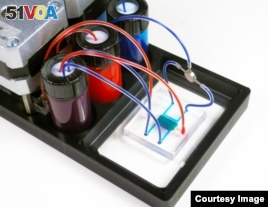09 November, 2014
51VOA听写整理,转载请注明出处。文本仅供参考,欢迎纠错!
From VOA Learning English, this is the Technology Report.
Testing new drugs for safety and effectiveness is a costly process in the United States. It also can take a lot of time. Some scientists are now designing silicon computer chips that act like human organs. The scientists think they have found a way to make the process faster and more economical.
The silicon chips are smaller than a child's hand. Each one has living cells that act and react like a human organ. The chips are being created as part of a program to test the safety of drug compounds. It is called the Tissue Chip for Drug Screening Program.

A neurovascular unit on a chip being developed by Vanderbilt University researchers. (Vanderbilt University Photo/John Wikswo)
It is a project of the US National Center for Advancing Translational Sciences, or NCATS. Danilo Tagle is the center's Associate Director. He says a three-dimensional computer chip can be designed to act like a human lung. He describes how such a device would operate.
"In that case, it would be cells representing the air sacs, that would be represented on these bioengineered devices and allowing it to breathe and expand, and be able to take in air, take in fluids just like a normal lung would."
Some computer chips contain very small models of the human digestive system. They copy the real function or duties of the human stomach and intestine, moving when breaking down food.
Drugs are added to the tiny organs for testing through instruments known as micro-tubes. Experiments with the tissue chips have produced more detailed information than tests using animal or cell models.
NCATS just announced $17 million in grants to develop an entire human organ system over the next three years.
Researchers at Columbia University are working on a project that would combine models of the heart, liver and circulatory system. The scientists hope to test how well some drugs work on diseases of the heart and liver.
At Harvard University, researchers are developing a tissue chip modeled on the heart and lungs. Together, the heart and lungs are part of the cardiopulmonary system. Both the heart and lungs are targets of some diseases. Many new drugs fail during the testing process because they may damage the heart. The Harvard researchers hope to create a cardiopulmonary system model that acts like a human system, both when it is diseased and in good, working condition.
Researchers say they can safely test the effects of a drug on different organ systems. They can use the tissue chips to observe a drug's effect on the organ or organs it is designed to target.
Scientists want to make the process of developing drugs simpler. They hope the chips will help them find the safest and most successful drugs before human testing begins.
And that's the VOA Learning English Technology Report. I'm Jonathan Evans.